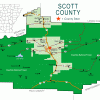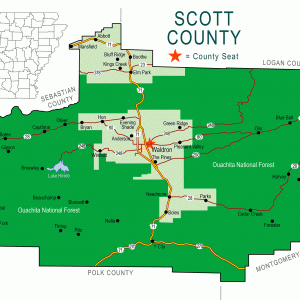calsfoundation@cals.org
Winfield (Scott County) [West]
Winfield is an unincorporated community in west-central Scott County located along Highway 248. Winfield was established in 1882 near the junction of Jones Creek and Ross Creek. Agriculture has traditionally been an important part of Winfield’s culture and economy. It is one of two communities in Scott County to have the name of Winfield.
The area’s first inhabitants included natives from the Archaic, Woodland, and Mississippian periods. Archaeological evidence suggests that natives of the Caddo tribe made their homes along the Poteau River and other prominent waterways in the area.
Throughout the late seventeenth and early eighteenth centuries, French trappers and explorers traveled west from the Arkansas Post along the Arkansas River. From there, they began traversing smaller tributaries such as the Fourche La Fave River and Poteau River. It is likely that they traveled through the area where Winfield is now located. There are also unsubstantiated stories of Spanish exploration in the western portion of Scott County.
Settlers began arriving in the area near Winfield as early as the late 1820s. The area continued to be settled from the 1830s to the early twentieth century. Most families participated in a wide variety of agricultural practices.
In the 1830s, one of the earliest families to settle in the Jones Creek Valley near Winfield was the Anthony family. Three brothers—William, Marlon, and Green—settled throughout the valley with one of the brothers settling close to present-day Winfield. The Anthony brothers were known for the quality livestock they raised. The area was originally named Tallow Creek because there was so much beef and mutton tallow being produced there. It is likely that Anthony Cemetery in nearby Oliver (Scott County) is named for the Anthony family since the grave of a William Anthony is located there.
The Civil War affected people living in the area near Winfield as it did throughout the rest of the Confederacy. Men who were called to fight in the war served with both the Confederacy and Union. Women, children, and the elderly were left to look after the homes and farms.
After the Civil War, there was a large migration movement into western Scott County, including the area around Winfield. The Winfield Baptist Church was organized in 1868 and was part of the Dardanelle Baptist Association. Originally, the church was known as Poteau Baptist Church. The name was changed to Winfield Baptist Church sometime in the twentieth century.
Soon after Reconstruction, Winfield became a more established community. Sehorn Cemetery, located in Winfield, was established circa 1875. The Winfield Post Office was established in 1882 with Richard Huie as the first postmaster.
In May 1882, the Scott County Courthouse burned, destroying all records that defined the boundaries of the various school districts that had been established throughout the county. In August, the county court reestablished the boundaries of the fifty-six school districts active in the county, including Winfield School District (Number 20).
During the Great Depression, many farmers in the area faced economic distress, as the price of cotton and crops had dropped significantly. The Winfield Post Office was discontinued in 1932, with the mail sent to Waldron (Scott County).
Several members of the Winfield community served during World War II. The Winfield School District was consolidated with Waldron in 1947. Winfield declined significantly with the loss of its school.
The Winfield school house is still standing in the twenty-first century but is in derelict condition and located on private land. It is near the Winfield Baptist Church, which retained a strong congregation. Agriculture is still a prominent way of life in Winfield, mostly in the form of cattle and chicken farms. Lake Hinkle, located five miles east of Winfield, is a popular recreational area for fishing, hunting, camping, and picnicking. The 960-acre lake was completed in 1971 in cooperation with the Arkansas Game and Fish Commission, the U.S. Forest Service, and the Soil Conservation Service (later renamed the Natural Resources Conservation Service).
For additional information:
Biographical and Historical Memoirs of Western Arkansas. Chicago: Goodspeed Publishing Company, 1891.
Cate, Michael. History of Scott County, Arkansas. Dallas: Curtis Media Corporation, 1991.
Goodner, Norman. A History of Scott County, Arkansas. Siloam Springs, AR: Bar D Press, 1941.
McCutcheon, Henry Grady. History of Scott County, Arkansas. Little Rock: H. G. Pugh and Company, 1922.
Ty Richardson
Richardson Preservation Consulting

 Scott County Map
Scott County Map 



Comments
No comments on this entry yet.